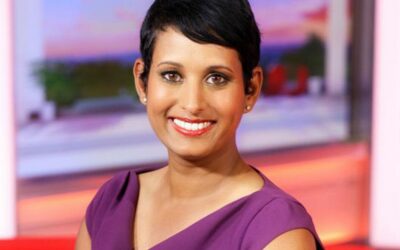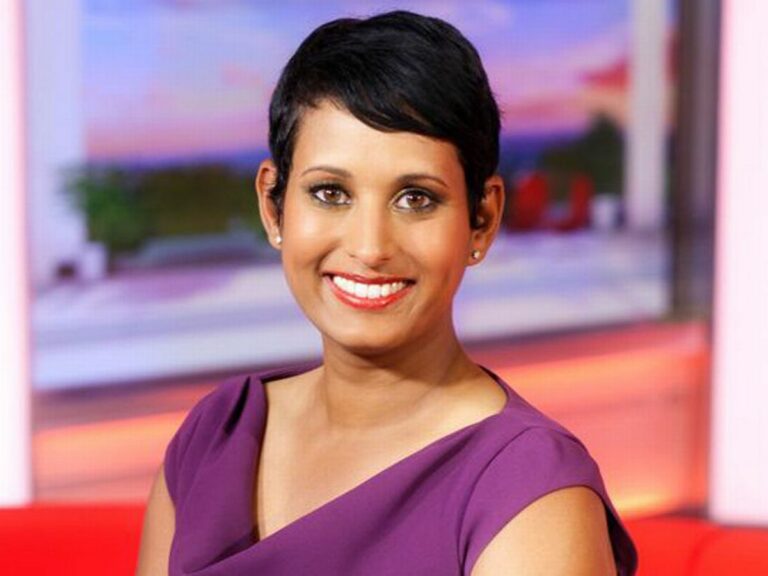A host of broadcasters and journalists, including Lenny Henry, Krishnan Guru-Murthy, Gillian Joseph, Michelle Matherson and Asif Kapadia have signed an open letter calling on the BBC to reconsider its decision, to uphold a complaint against Breakfast presenter, Naga Munchetty.
She is said to have breached the BBC’s editorial guidelines by criticising Donald Trump, when he said that 4 politicians should “go back” to “places from which they came.”
An investigation was launched following a viewer’s complaint and the BBC Executive Complaints Unit (ECU) found that Munchetty had been entitled to give a personal response to Trump’s tweets but that her comments had gone beyond what is permitted by the BBC’s guidelines, because she had criticised the US President.
“Our audiences should not be able to tell from BBC output the personal opinions of our journalists or news and current affairs presenters on matters of public policy, political or industrial controversy.”
However, in the open letter, printed in the Guardian, other broadcasters say that this is a misunderstanding of the guidelines and a “form of racially discriminatory treatment towards BAME people who work on programming.”
“The BBC’s editorial guidelines allow for ‘professional judgment, rooted in evidence’, and require ‘cultural views in other communities’ to be taken into account. The ECU – which we believe does not reflect the diverse cultural views in the BAME communities in the UK – has failed to acknowledge the following:
– Racism is not a valid opinion on which an “impartial” stance can or should be maintained;
– For communities and individuals who experience racist abuse – including Munchetty – being expected to treat racist ideas as potentially valid has devastating and maybe illegal consequences for our dignity and ability to work in a professional environment, as well as being contrary to race equality and human rights legislation;
To suggest a journalist can “talk about her own experiences of racism” while withholding a critique on the author of racism (in this case President Trump) has the ludicrous implication that such racism may be legitimate and should be contemplated as such.”
The letter continues:
“While we stand in support of Munchetty, the consequences of this decision are widespread with implications for the entire media landscape in the UK and those who work within it. The scope of its effect is already evidenced in the unprecedented number of BAME media figures who have openly and publicly voiced their condemnation on social media.”
It also says that a number of BBC journalists have contacted the signatories privately to “express their concern at the climate of fear at the organisation, their feeling of being censored, and their apprehension at the consequences of their speaking out in support of this statement.”
They are requesting that the BBC revisits and “takes seriously” overturning its decision.
Also that BBC management “issue their support for journalists and acknowledge there can be no expectation of impartiality’ over expressions and experiences of racism.”
Thirdly it says that the bodies which oversee complaints, including ECU and Ofcom should “address their own levels of diversity and increase transparency as to how they reach their decisions, and how that process takes place in a manner reflective of the diversity of the population
“We believe that, in addition to being deeply flawed, illegal and contrary to the spirit and purpose of public broadcasting, the BBC’s current position will have a profound effect on future diversity within the BBC. To suggest that future BAME broadcasters will be hired at the corporation on the premise that they remain “impartial” about how they feel about their experiences of racism is ludicrous. To require journalists of all ethnicities and races to endorse racism as a legitimate “opinion” is an abrogation of responsibility of the most serious nature.”
Speaking to Radio 4’s Today programme earlier today, David Jordan, BBC’s Director of Editorial Policy and Standards said:
“The line is not about calling out racist comments – which is perfectly acceptable when things are clearly framed in racist language – it’s about how you go on to discuss the person who made the comments and make assumptions or remarks about that.
“In the politics of the present, when we are in a politics of name calling and insult, I think it’s probably unwise of the BBC to be calling out people for being liars or racist. What is really important is that we look at the things people say, we analyse them, we describe them objectively. If someone’s told a lie, we call it out for being a lie. If someone’s made a racist remark, we make sure people are aware that they’re inherently racist.”
He explained:
“The issue is about when she went on further to discuss President Trump himself, what his motivations were for that, and that breached our impartiality requirements. Our audiences should not be able to tell from BBC output the personal opinions of our journalists or current affairs presenters on matters of public policy, political, or industrial controversy.”










